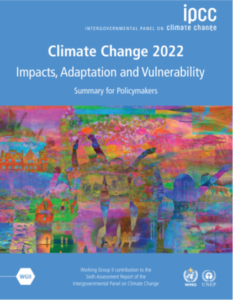The terrible events in Ukraine have overshadowed the latest IPCC report, and rightly so. The loss of life, the casualties and the attack on the civilian population are of immediate concern. There is already little doubt that the invasion of Ukraine will have historic consequences for the Ukrainian people and the global economy. Some of the immediate consequences for travel and tourism are addressed in the March edition of RTNews.

Climate change is a clear and present danger too. Greenhouse gases continue to accumulate; in January 2020, the concentration of CO2 in our atmosphere was 413.30 ppm. In January of this year, it reached 417.99 – not even the global economic slowdown caused by Covid has slowed the rate of growth of emissions.
The Intergovernmental Panel on Climate Change, the IPCC, has just published its latest report on the consequences of climate change. It makes for grim reading. No one should be surprised by its contents; there is nothing new in the report “Impacts, Adaptation and Vulnerability”,
which is a government-approved report.
This report is about risk, the risk to us, all of us, which results from the burning of fossil fuels and the consequent accumulation of greenhouse gases in our atmosphere. The IPCC’s report provides a framework for governments and industries to understand our vulnerability and exposure and to shape a response based on adaptation, resilience, equity and justice. The IPCC reports on “the increasingly severe, interconnected and often irreversible impacts of climate change on ecosystems, biodiversity, and human systems.”
The IPCC report identifies “irreversible impacts as natural and human systems are pushed beyond their ability to adapt.” They report with high confidence that “climate change has caused substantial damages, and increasingly irreversible losses, in terrestrial, freshwater and coastal and open ocean marine ecosystems” and “widespread deterioration of ecosystem structure and function, resilience and natural adaptive capacity, as well as shifts in seasonal timing have occurred due to climate change with adverse socioeconomic consequences.”
The IPPC reports that the consequences of climate change are now baked in. With “very high confidence” they assert that “near-term actions that limit global warming to close to 1.5°C would substantially reduce projected losses and damages related to climate change in human systems and ecosystems, compared to higher warming levels, but cannot eliminate them all.”
We have condemned ourselves to have to live with the damaging consequences of climate change, we need now both to adapt and reduce our emissions and to assist others to do so in the developing world. They bear the costs of climate change despite having made little contribution to the cause of the damage.
As Cape Town approached Day Zero in 2018, the day when the city’s water supply would have needed to be shut off and some four million inhabitants would be left without water, water consumption fell in three weeks from roughly 780 megalitres per day to under 550. Recent research from Stanford University suggests that droughts are likely to be more frequent. Climate change brings more frequent extreme weather events, storms, flooding, wildfires and drought.
At WTM Africa on 12 April in the Responsible Tourism programme, we have sessions on climate change and resilience.
15:00-15:45 Tackling Climate Change
The latest IPCC report, “Impacts, Adaptation and Vulnerability“, is about risk, the risk to us, all of us, which results from the burning of fossil fuels and the consequent accumulation of greenhouse gases in our atmosphere. The IPPC reports that the consequences of climate change are now baked in. With “very high confidence” they assert that “near-term actions that limit global warming to close to 1.5°C would substantially reduce projected losses and damages related to climate change in human systems and ecosystems, compared to higher warming levels, but cannot eliminate them all.” Our industry contributes to greenhouse gas emissions through aviation and ground transport and heating, cooling and lighting accommodation. What can we do to reduce our emissions? On current trends sea-level rise, extreme weather events and wildfires are expected. How can we adapt to these challenges?
Moderator: Harold Goodwin, WTM Responsible Tourism Advisor
Chris Van Zyl, Group Environmental Manager, The Vineyard
Goosain Isaacs, Director, Climate Change, Western Cape Government
Karien Erasmus, a Senior Manager Risk Advisory Services at BDO, and part of the first phase of the Tourism Sector Risk and Climate Change study for the SA National Department of Tourism
16:15-17:00 We Need to Increase Our Resilience
The Covid pandemic has demonstrated the vulnerability of our industry to travel bans and fear. Cape Town was not the first destination to suffer from severe drought and a large reduction in arrivals – and it will not be the last. What can businesses and destinations do to increase their resilience? What can you do? What do you need to do?
Moderator: Harold Goodwin, WTM Responsible Tourism Advisor
Lee-Anne Bac, Director, Strategic Development and Advisory
Simon Blackburn Sustainability Director, African Safari Collective
Gareth Morgan, Acting Executive Director: Future Planning and Resilience City of Cape Town
Hermione Nevill, Senior Tourism Specialist at World Bank Group
The complete WTM Africa Responsible Tourism programme can be found here.

